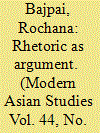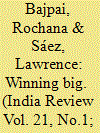|
|
|
Sort Order |
|
|
|
Items / Page
|
|
|
|
|
|
|
| Srl | Item |
| 1 |
ID:
096270


|
|
|
|
|
| Publication |
2010.
|
| Summary/Abstract |
Social justice is a key concept in the theory and practice of affirmative action. In India, social justice has come to serve as shorthand for affirmative action for disadvantaged groups, mainly lower castes. This paper provides a detailed analytical interpretation of social justice in a landmark legislative debate on quotas in India, namely the 1990 Mandal debate. It unpacks political rhetoric to reveal distinct conceptions of social justice, shows that claims for quotas for Other Backward Classes (OBCs) in the bureaucracy drew substantially on principles of social justice and democracy and argues that, despite appearances, several arguments for OBC representation in government jobs were compatible with the principle of merit. In doing so, the paper demonstrates that contrary to common opinion, political rhetoric deserves close attention. A reconstruction of political arguments over affirmative action advances understanding of some puzzling features of lower-caste politics in India. It also illuminates important questions in political theory debates on social justice.
|
|
|
|
|
|
|
|
|
|
|
|
|
|
|
|
| 2 |
ID:
184780


|
|
|
|
|
| Summary/Abstract |
Politicians winning elections with large margins of victory, beyond what is necessary to win electoral contests,what we term “winning big”, is a common, yet under-studied phenomenon across the world. Political economy models suggest that winning big is not an optimal allocation of scarce campaign resources in a SMP/FPTP electoral system. Inductive inquiry shows that incumbent politicians likely to win nevertheless campaign hard, often devoting considerable effort and resources, for reasons that remain unexamined. Focusing on India, this article explores a range of reasons that can help explain this phenomenon through an innovative research design that combines quantitative analysis with in-depth elite interviews with incumbent MPs from 10 states. We distinguish the phenomenon of “winning big” from that of “safe” seats,identify and probe factors that can contribute to large margins, including candidate strategy, party popularity, mobilizers, electoral uncertainty, and party control . Our findings suggest that while political parties in India, as elsewhere, do not spend more money on electoral contests that they likely to win comfortably, winning big can be the result, among other factors, of a party strategy to establish a reputation for invincibility, and/or individual efforts, stemming from a sense of political vulnerability felt by politicians, underestimated in the literature on safe seats.
|
|
|
|
|
|
|
|
|
|
|
|
|
|
|
|
|
|
|
|
|